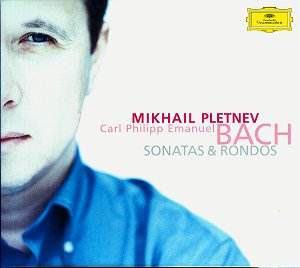Mikhail Pletnev is one of those rare musicians that
can make their instrument do anything. Known as a stunning virtuoso
of the big 19th and early 20th century repertoire, he showed what he
is really capable of a few years ago with his sensational recording
of Scarlatti harpsichord sonatas. Here he does much the same thing.
This reviewer must point out that he is a fan of period instruments.
However, it is artists like Pletnev that provide the best argument against
the use of them. Just as he made his modern piano have all the sparkle
and edge of Scarlatti’s harpsichord, here he brings to C P E Bach’s
sonatas a lightness and clarity that one would think only possible with
a fortepiano. At the same time, he makes a quality of sound that is
almost magical. It is hard to find a single thing to criticise. Period
instrument fan or not, one has to say that this guy really knows what
he is doing.
He is helped a lot by his chosen repertoire. How long
has C P E Bach dwelt in the shadowy cleft formed by his massive father
on one side and Mozart on the other? For so long his era has been only
labeled ‘pre-classical’ implying some form of proto- style, undeveloped
and awaiting Mozart and Haydn to turn it into a fully fledged chapter
of the music history books. Pletnev shows just how wrong this view is
in dazzling performances of music that is of nothing less than the absolute
first rank. The programme consists of six sonatas and three rondos,
as well as the concluding Andante con tenerezza. The differences between
these works are striking. We know from Bach’s own writings that the
rondos were a commercial product - elegant and simple music aimed at
the cultivated amateur market. Pletnev performs them with clarity and
elegance. But it is the sonatas that show the real Bach.
C P E was the first composer to move away from the
doctrine that each movement or sonata must maintain a single mood or
"affect" throughout. Heavily criticised for it in his own
time, we can see in this the first stirrings of ‘Sturm und Drang’ and
even of the romantics of a century later. The sonatas in g minor and
f sharp minor cover the gamut of emotions, expressed through lilting
melody, dramatic unison passages or free toccata style virtuosity. Much
of the music has the feel of the best Mozart, but there are so many
resonances that are more forward looking still. There are bits of Beethoven,
harmonic colourings that bring Schumann to mind, and many of the free
toccata passages sound more like Saint-Saens’ homages to C P E’s father
than they sound like the older Bach himself. The first movement of the
wonderful g minor sonata could have been the model for the opening of
Saint-Saens’ second piano concerto.
DG has so much experience recording great pianists
that there seems little point commenting on the recording quality. They
have captured Pletnev completely at ease, sounding like he is making
the music up one moment, and exercising the most carefully thought through
intellectual rigour the next. A constant succession of drama, thought
and beauty recorded with pearl drop beauty of sound and the clarity
of Waterford crystal. It is all elegantly packaged with a good background
essay by Ulrike Brenning (particularly well translated by Stewart Spencer
- Oh, that that could always be said!) There is nothing wrong with this
CD. A good bet for another Gramophone award.
Peter Wells


